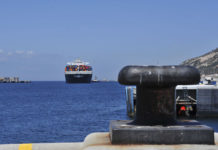Written by Massimo Pascarella –
 The immigration system of Turkey is currently in a severe situation by more than 2.7 million Syrian refugees, who have entered the country since the beginning of 2011 with the outbreak of civil war in Syria. The EU-Turkey agreement of March comes in aid to both actors, but it needs to be explained under the implications and complications regarding the International (humanitarian) law.
The immigration system of Turkey is currently in a severe situation by more than 2.7 million Syrian refugees, who have entered the country since the beginning of 2011 with the outbreak of civil war in Syria. The EU-Turkey agreement of March comes in aid to both actors, but it needs to be explained under the implications and complications regarding the International (humanitarian) law.
Right from the start of the Syrian crisis in 2011, Turkey opened its borders by offering a safe haven to a few hundred displaced people fleeing from the main combat areas of the country.
With the intensification of the conflict and the operational standoff, Ankara has maintained the “open door policy”, meanwhile the number of Syrian refugees in Turkey has increased .
The text approved by COREPER (1) on February 3th provides a transfer to Turkey of €3 billion to be used to improve the living conditions of the Syrian refugees in Turkish territory and to contain the flow of migrants (2).
It will be financed by the Community budget for a third, and for two thirds by the Member States according to their GDP. Furthermore, the agreement envisages the possibility for its citizens to travel without visas within the 28 European State borders, in addition to the opening of chapter 33 (concerning the budget) related to the accession process of Turkey to EU.
The agreement principles.
The Cooperation agreement on migration between the European Union (EU) and Turkey, was confirmed by the European Council on March 17th-18th. It represents the last (and desperate) European attempt to put in place a radical and decisive solution to the immigration crisis by stopping the flow of migrants and refugees (3), which continues to reach Europe crossing Aegean sea and passing along the Balkan route (4).
The agreement of March 7 has established that all migrants who arrive on the Greek islands will be returned to Turkey, including potential asylum seekers (and among them, Syrian refugees); for each Syrian readmitted in Turkey, another one will be resettled from Turkey to an EU Member State.
Before being repatriated, all migrants will be recorded and able to apply for asylum on the Greek islands. Applications will be individually examined by Greek authorities in accordance with “EU Directive 32/2013” (from now on “Directive”) and with UNHCR support.
Those who won’t apply for asylum or whose application will be deemed inadmissible or unfounded, on the basis of the above –mentioned Directive, will be repatriated to Turkey. For every Syrian reallocated into Turkey, another one will be resettled in a EU country, however, there is a limit of available places (5).
On April 4th the Hellenic authorities launched the transfer operations to Turkey of those migrants who reached illegally Greek shores.
The resettlement “coupons” available for Syrians in Europe are not unlimited . To avoid requesting additional commitments to the already reluctant governments of many Member States, the European Commission needs to base its policy on numbers already concurred among the EU countries last year to handle the emergency (72,000 allocations). This number is obtained by adding 18,000 places still up for grabs (of 22,000 agreed in July) to resettle in Europe currently Syrian refugees staying in Syrian neighboring countries, and the 54,000 originally expected to relocate the migrants that have reached Hungary from mid- 2015 to other European countries (6).
Considering the daily arrivals in Greece (about 1,500-2,000 people) and assuming that 55% is Syrian, this would mean that the places available for resettlement would run out in (more or less) two and a half months.
It’s noteworthy to say that the agreement draft relies on the expectation of a decrease in arrivals from Turkey, after this period of emergency. Subsequently, it has been envisaged resettling Syrian from Turkey in Europe on a mere voluntary basis.
The critics.
The EU-Turkey agreement has been criticized by various NGOs, such as Human Rights Watch and Amnesty International, which have found in it the intrinsic risk of collective expulsions, forbidden by art. 4 (7) of Protocol 4 annexed to the European Convention on Human Rights (ECHR) and art. 19, par. 1, of the Charter of Fundamental Rights (CDF). This violation is produced by the basic principle “for every Syrian readmitted in Turkey, another one will be resettled in Europe”. This one-for-one mechanism collides with the above-mentioned articles, where the individual circumstance of every person represents the key element.
Furthermore, considering that this mechanism is applied only to Syrians, it is clearly in contrast to the prohibition of discrimination on the basis of their home country, enshrined in the art.3 of the Geneva Convention on Refugees.
The agreement provides that only Syrians can be resettled in Europe, among others asylum seekers (8). Consequently, only Syrians would have the opportunity to benefit from international protection in a European country, while all other potential beneficiaries would be forced to remain in Turkey.
Moreover, has been underlined the risk of breach to the principle of non-refoulement, enshrined by art. 33 of the 1951 Geneva Convention on Refugees.
The article establishes that nobody can be expelled to a State where there is a pragmatic risk of being persecuted, tortured or subjected to other inhuman or degrading treatments.
Therefore, European countries have the obligation to verify (in each case) that the expulsion of a foreigner to Turkey complies with this principle (9).
Furthermore, only if Turkey can be considered a safe third country, the non-refoulement principle won’t be infringed.
– The concept of safe third country
– The Directive, by means of art. 38, lists the criteria a country has to fulfill to be regarded as safe third country:
– The respect of non-refoulement principle;
– The absence of threats to the life and liberty of the applicant for reasons of race, religion, nationality, political opinion or membership to a particular social group ;
– The absence of serious threat’s risk to the life of the applicant, stemming from indiscriminate violence in situations of armed conflict (10);
– The possibility to request refugee status and receive protection in accordance with the Geneva Convention.
It has to be considered that the Turkish President Erdogan and his government are leading an intense repression against human rights:
– The failure of the peace process with the Kurds and the prolonged security operations in the southeast;
– The repression of dissidents, political opposition and local media perceived as hostile to the government (11);
In addition, Turkey presents a history of tortures and inhuman or degrading treatments against migrants and asylum-seekers located in detention centers. Several episodes have been reported by local and International NGOs, as well as ECHR Court has recognized in several cases the violation of art.3 to the correlated Convention (12).
In addition, although in 2014 Ankara approved the Law on Foreigners and International Protection 812), the management of migrants remains weak and extremely critical in several respects, even for Syrian citizens:
– First of all, to Syrians is not recognized the refugee status, consequently the correlated rights neither.
– Second, the entire immigration management is entrusted to the Turkish Authority for Disaster Management and Emergency (AFAD), which answers only to the Prime Minister and has been known for its lack of transparency. For example, UNHCR is not allowed to enter into AFAD‘s refugee camps while it is very active İnsani Yardım Vakfı (İHH), a Turkish NGO several times subject of investigations for alleged trade with armed groups in Syria.
– Third, more than three-quarters of Syrian refugees live outside the camps, in the suburbs of major cities, often in dramatic conditions.
Conclusions.
On the basis of previous criteria established by the Directive, Turkey seems to lack of the Directive’s prerequisites to be considered safe third country, in order to manage efficiently and according with EU principles the migrant crisis.
No less important, the agreement seems to present a low grade of feasibility due to the enormous quantity of daily asylum requests that Greek (14) authorities have to (individually) examine, considering all the problems Athens had during 2015 managing the immigrant flow in Lesbo, showing its bureaucratic slowness.
These factors explain that the mechanism provided by the agreement represents such a temporary and extraordinary measure, that probably won’t last to the end of 2016 if not improved in such deficiencies, due to the European Court of Human Rights that at these conditions will (probably) declare the agreement contrary to the European Union law.
Notes:
1 – The Committee of Permanent Representatives of EU States.
2 – In addition to €3 billion already offered to Turkey, in March the EU has agreed to pay €3 billion extra to Ankara by 2018.
3 – More than 850,000 in 2015.
4 – During 2015 this route has been the most used with a volume of unprecedented traffic, 900 thousand migrants on 1.1 million who entered into Europe illegally (plus 140 thousand new registered inputs in the first 80 days of 2016).
5 – 72,000 in total for 2016.
6 – Places remained available after Budapest rejected the deal in September.
7 – Specifically the article declares that the “reasonable and objective examination of the particular case of each individual alien of the group” represents the only way to not make for massive and fast expulsions, violating the Convention.
8 – The countries of refugees’ origin using the Balkan route 50% is from Syria, Afghanistan 20% and 7% from Iraq, who are joined by Iranians, Pakistanis, Eritreans and Somalis in minor percentages.
9 – Principle that has to be applied not only to asylum seekers but to all migrants.
10 – Death penalty; torture, inhuman or degrading treatment. See also EU Directive 95/2011.
11 – See the newspapers’ cases of ” Today’s Zaman ” and ” Cihan “.
12 – See the cases:“Abdolkhani and Karimnia v. Turkey” and “S.A. v. Turkey”.
13 – For the law see http://www.goc.gov.tr/files/files/eng_minikanun_5_son.pdf
14 – Between 1000-1500 thousand.
Bibliography.
– Turquie. Des expulsions collectives illégales de réfugiés syriens mettent en évidence de graves lacunes dans l’accord avec l’UE, https://www.amnesty.org/fr/latest/news/2016/04/turkey-illegal-mass-returns-of-syrian-refugees-expose-fatal-flaws-in-eu-turkey-deal/, Amnesty international, 01/04/2016
– Il faut dire non à un mauvais accord avec la Turquie, https://www.amnesty.org/fr/latest/news/2016/03/say-no-to-a-bad-deal-with-turkey/, Amnesty International, 17/03/2016
– La Turchia e la gestione dei flussi migratori: quale soluzione?, http://www.bloglobal.net/2016/03/turchia-immigrazione-unione-europea-quale-soluzione.html, Filippo Urbinati, 09/03/2016
– In dettaglio – Accordo Ue-Turchia: tra promesse e realtà, http://www.ispionline.it/it/articoli/articolo/europa-global-governance/dettaglio-accordo-ue-turchia-tra-promesse-e-realta-14844, ISPI, 17/03/2016
– Migrazioni: l’accordo Ue-Turchia entra nel vivo, funzionerà?, http://www.ispionline.it/it/articoli/articolo/europa/migrazioni-laccordo-ue-turchia-entra-nel-vivo-funzionera-14920, ISPI, 04/03/2016
– La Turquie face a de multiples defis, http://www.iris-france.org/72764-la-turquie-face-a-de-multiples-defis/, IRIS, Didier Billion, 08/03/2016
– Vertice di Bruxelles: l’accordo che non piace al diritto internazionale, http://www.ilcaffegeopolitico.org/40094/vertice-di-bruxelles-un-accordo-poco-piace-al-diritto-internazionale, Sara Belligoni, 07/04/2016
– L’accordo UE-Turchia: le criticità di un accordo a tutti i costi, http://www.sidi-isil.org/sidiblog/?p=1736, Emanuela Roman, 21/03/2016
– UE/Turquie : L’accord sur les reconduites massives à la frontière menace les droits humains, https://www.hrw.org/fr/news/2016/03/15/ue/turquie-laccord-sur-les-reconduites-massives-la-frontiere-menace-les-droits, HRW, 15 MAR 2016
– Accordo Ue-Turchia sui migranti, quali vantaggi per Ankara, http://www.cesi-italia.org/articoli/557/accordo-ue-turchia-sui-migranti-quali-vantaggi-per-ankara, Lorenzo Marinone, 18/04/2016













